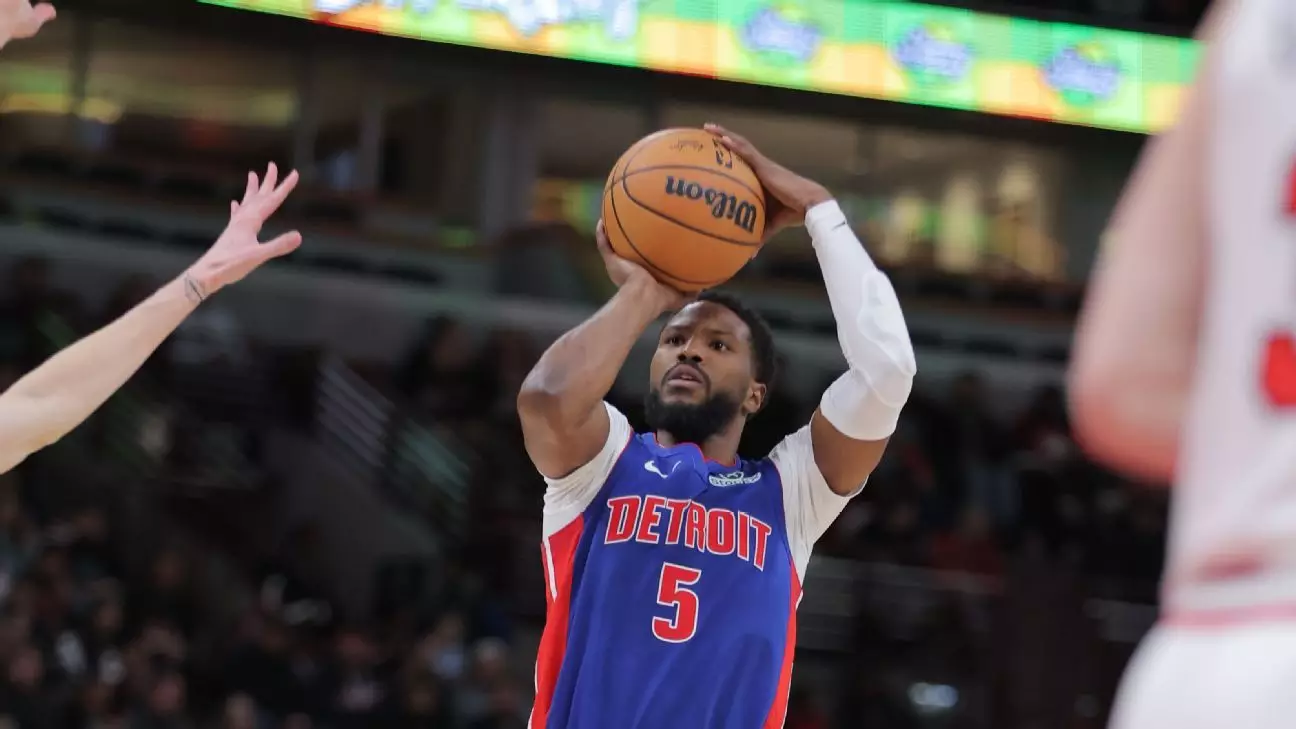Federal authorities have recently turned their attention to Malik Beasley, currently a guard for the Detroit Pistons, over allegations related to gambling on NBA games and player prop bets. This revelation is not merely a fleeting scandal but a troubling symbol of the growing vulnerabilities within professional sports, particularly the NBA. What should be a celebration of athletic prowess is increasingly becoming entangled with the shadowy world of betting—a world that threatens the very integrity of the game.
Beasley’s career numbers underscore a player on the rise: in the 2023-24 season, while with the Milwaukee Bucks, he averaged a solid 11.3 points over 79 appearances with a personal best of 77 starts. Yet, it is precisely this season that lies at the heart of the investigation. Unusual betting activity reportedly began to spike around January 2024, centered on Beasley’s statistical outputs. One notable example: during the Bucks’ January 31 match against the Portland Trail Blazers, sportsbooks saw an inexplicable surge of bets on Beasley recording fewer than 2.5 rebounds—a line that shifted dramatically in response, before he ultimately secured six rebounds and those bets lost.
Gambling’s Unsettling Grip on the NBA
The very notion that professional athletes may be entwined in prop bets, especially on their own performances, raises profound ethical and legal concerns. The gaming industry’s data serves as a double-edged sword: it helps detect anomalies but also exposes players like Beasley to suspicion before any formal charges. While Beasley’s legal counsel points out he has not been charged, the mere presence of a federal probe is enough to cast a long shadow on both his career and the NBA’s reputation.
This predicament isn’t isolated. The NBA has grappled with similar issues in recent years—Jontay Porter’s suspension for disclosing confidential information to bettors and Terry Rozier’s ongoing investigation remind us that this is far from a new problem. These cases collectively illustrate a league wrestling with the consequences of legalized sports gambling and the difficulty of policing an ever-blurring line between players’ private conduct and public entertainment.
The Fragile Boundary Between Competition and Corruption
Sports betting’s legal expansion has brought undeniable benefits—economic growth, fan engagement, and new revenue streams. However, the flipside is an increased risk of corruption. Professional athletes wield immense influence over game outcomes and statistics. When betting markets attach real money and real risks to these variables, the temptation for unethical behavior surges.
Beasley’s situation is a cautionary tale. Despite being an established player—a nine-year veteran with a reputation as a sharpshooting specialist and a record-breaking season for three-pointers with the Pistons—his off-court decisions could jeopardize everything he’s earned. Compounding the public’s concern is his past legal trouble: a 2020 felony guilty plea related to threats of violence resulting in jail time and an NBA suspension. This history may undermine public confidence and patience, as it adds a layer of perceived risk about his decision-making character.
Accountability Demands Transparency and Vigilance
In the current climate, the NBA finds itself at a crossroads. If it wishes to maintain legitimacy in the eyes of its global audience, it must prioritize transparency, enforce stringent policies, and cooperate fully with federal investigations. The Pistons’ caution in halting contract talks with Beasley illustrates how pending investigations can derail player and team plans alike, but it also signals the proper weight that such matters deserve.
Critics might argue that suspicions and investigations undermine players’ rights, yet the league cannot afford complacency. The presumption of innocence must be balanced against the need for proactive integrity measures. Betting scandals, even unproven, erode fan trust and threaten to reduce talented athletes to mere pawns of gambling syndicates and speculative markets.
Reimagining Player Responsibility in the Age of Betting
The NBA and its players must collectively redefine their approach to sports betting. Education campaigns, strict enforcement, and cultural shifts are necessary to prevent unhealthy affiliations between athletes and gambling. It’s no longer enough to rely on reactionary measures after the damage is done; a preventative and enlightened stance is crucial.
Malik Beasley’s predicament is a stark warning—not just about one player’s choices but about the broader risks facing professional basketball in an era where odds and bets follow every dribble and shot. The league, its stakeholders, and fans deserve a product that is untainted by corruption or impropriety, and safeguarding that product demands fierce vigilance and a collective commitment to integrity.


Leave a Reply